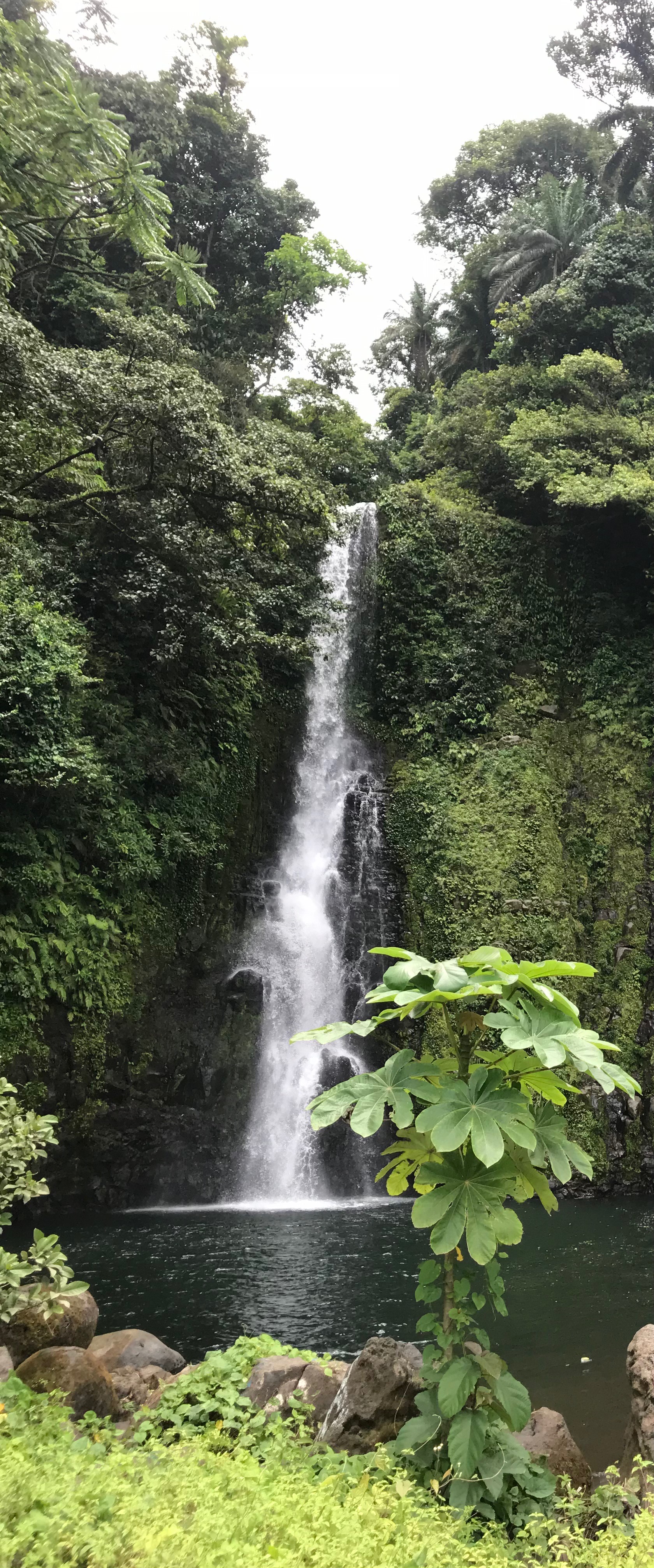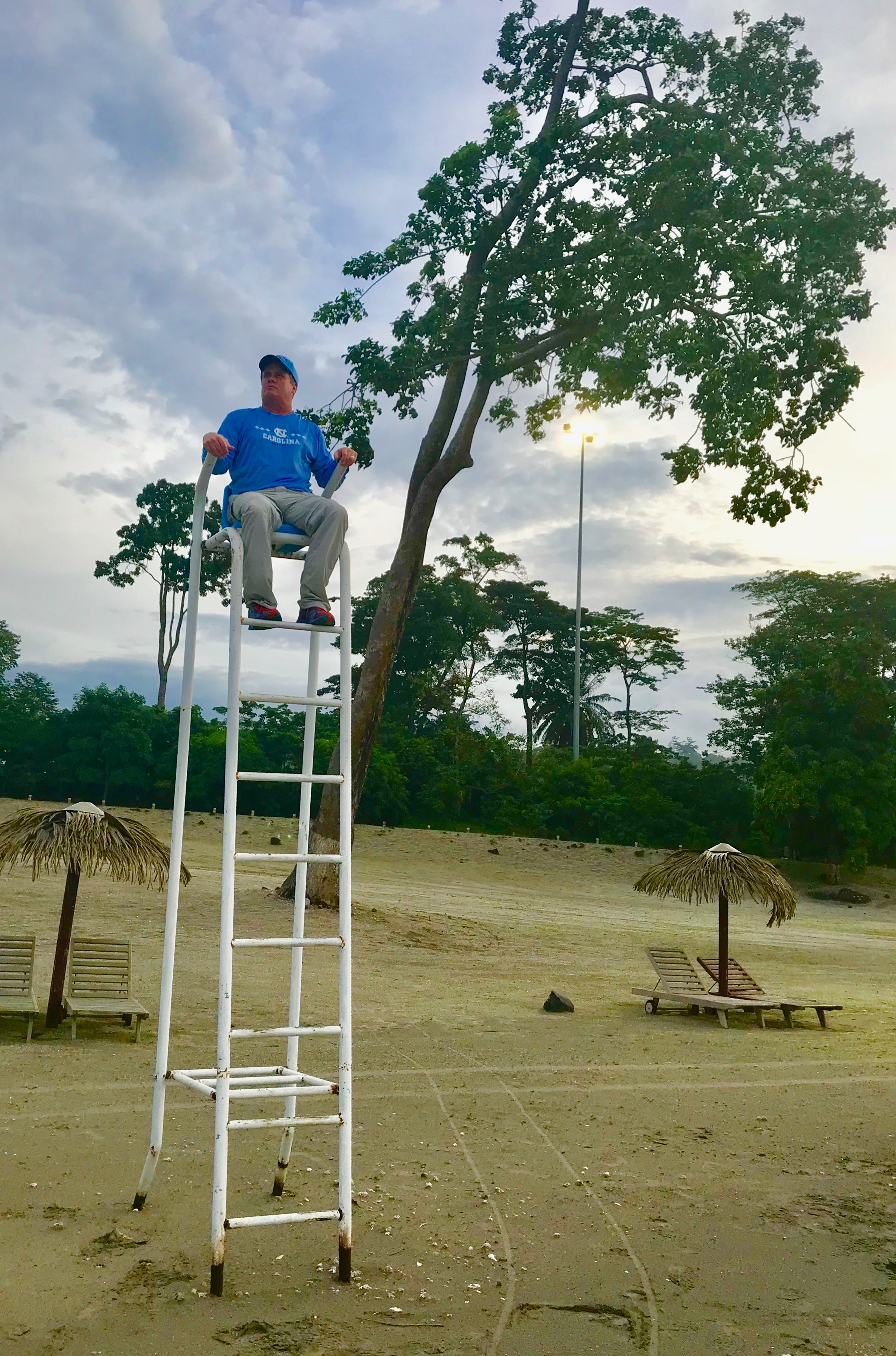
Country Information: Fun fact about Equatorial Guinea: its name is derived from its proximity to the equator and the Gulf of Guinea. Capital is Malabo, and there are ~ 1.4 million people living here. The official languages of Equatorial Guinea are Spanish, French and Portuguese. The majority of Equato-guineans practice Roman Catholicism.
Equatorial Guinea has many sandy beaches and immaculate mountainous plains. Located on the island of Bioko, Pico Basile is the tallest volcanic mountain in the country and is a wonder to the eye. Corisco is an island off the coast of the country with breathtaking natural beaches.
Jim’s Perspectives:
Truly, truly one of the strangest countries on this planet. This country reminds me of Macedonia … particularly of the city of Skopje … where there are an awkward number of out-of-place statues lining the streets. Both places try wayyyy too hard. As I’m writing this, I’m sitting on the tarmac in Malabo on a brand new 737-800 operated by Ceiba, the national airline, which doesn’t have a website where people can book tickets, check schedules, etc. … more on that later.
Let’s begin with the good. EG doesn’t require US citizens to have a visa to enter the country, which is unusual for Africa. Also unusual, the roads around Malabo and the island are well paved, with concrete roads in the rainforest. My hotel, the Sofitel Sipopo, couldn’t have been better. It’s clearly the best on Bioko, which the island is called. Malabo is the capital city on Bioko, and serves as the political capital of EG. Bata, on the mainland, is the economic capital. And lastly, EG is Africa’s only Spanish speaking country … a huge bonus for me as I’ve spent years studying Spanish, and most of Africa speaks French.
Paranoia. There’s no other (or better word) to describe this place. From the moment you arrive, it’s unmistakable. Looking retrospectively, perhaps this insecurity can be traced to Equatorial Guinea being traded by the Portuguese to Spain in the 1700s for parts of Latin America, afterwards becoming a hub for the west African slave trade to South America. Furthermore, EG is a got-rich-quick country. As a former Portuguese and Spanish colony, which existed in abject poverty for centuries, it discovered black gold in the early 2000s, radically altering its direction. With its new oil wealth, the leaders of EG’s government had to quash two coup attempts, one which included the son of a British Prime Minister Margaret Thatcher. Therefore, the government is paranoid of everything and everyone. And the paranoia is real: You’re handed a tourist permit which needs to be kept on-person at all times. Huh, seriously? At all times?! Your bags will get searched at the airport. You may not take pictures without permission … and if you do you will find yourself at the local PD, having to pay a $25 mea culpa. Want to post a photo on Facebook? Sorry, the site is blocked (unless you use a VPN), as it is in Iran. Is your hotel room bugged? Wouldn’t doubt it. Going back to my Ceiba airlines story at the beginning of this article … now you understand why you cannot make a reservation online! I can hear you thinking/saying, “Ah hah, I get it now!”
When touring around the island as I did in 2018, (I recommend the Loop tour), you’ll get stopped 6-7x at check points, which will keep you wondering, “What are they checking for?” I asked my guide this question, to which he shook his head indicating that he didn’t know the answer. Throughout the country you see many large, lavish buildings, seemingly out-of-place in remote places far from population centers. They might be banks, conference centers, grocery stores, office buildings—there are 100s of them—with one thing in common: they are all empty, likely built by a friend or family member of a government minister or family member. In Sipopo, reverently known by the government as Malabo II (a do-over of junky Malabo), there are restaurants, an enormous shopping mall, office buildings … all completely empty. The impressive Congressional Conference Center sits idly and you guessed it – empty. The lovely 200 room Sofitel Sipopo was at most 10% occupied when I was there. Nearby, the government built 53 presidential palaces in Sipopo, one for each of the heads of state in Africa, for if/when they come to visit EG! The hotel in Moca, a government pet project, sits completely empty for most of the year. And get this … there are plans to build a luxury supermarket nearby, as well as a movie theatre … even though there are very few tourists or residents who can afford the food or the price of admission to a movie. Predictably, the buildings will be built but will never open.
So, what’s the deal with all of the profligate spending? Well, if you have it – spend it! Sipopo cost $3.2 billion USD, and it’s a ghost town. The new highways through Malabo II are eerily deserted. The port expansion cost $1 billion USD, yet is empty. The Paseo Maritimo (pedestrian walk) is spectacular, but sparsely used. A new international airport is being built, a lavish first-world facility that will have all the bells and whistles. However, there are only 1-2 flights per week into the country, mostly to/from Spain. Currently, the airport lounge is only open from 6-11pm, corresponding to the Iberia flights to Spain.
Why is EG empty? Well, many Equatorial Guineans have left their country in search of better jobs and opportunities. Those who are not connected to the government have little to do on the island. And, with the low price of oil, jobs are scarce. And to make matters worse, as EG is an island, everything has to be imported into the country. And I mean everything: all types of food products, including even fruit and the wine. Get this … they even import the bottled water, although EG is one of the wettest places on the planet, receiving 400 inches of rain per year!
OK, so why does the construction and spending continue? Megalomania. This country so badly wants to show others how wonderful they are, again reminiscent of downtown Skopje Macedonia.
The waste of this wealth in EG is staggering. While the government should be applauded for the “social houses” they have built, most Equatorial Guineans earning $250 per month can not afford a $125,000 condominium. Sipopo is beautiful but deserted, as are its highways, hotels, etc. and yet gasoline costs $1 per liter ($4 USD gallon), and food is prohibitively expensive. Want to buy a motorcycle to get around? Nope, not allowed.
This country has soooo much potential, however, like most of Africa leaves one wondering, “What if?” What if millions/ billions were invested in job training programs? Perhaps in tech, tourism, manufacturing? What if EG refined their own petroleum, instead of letting others profit from it? What if EG invested in their future, for when the oil runs dry, like they’ve done in Qatar?
The future could be bright in this tiny powerhouse of a country. Wow, what a place.



